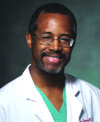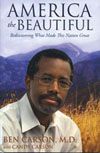|
by Dawn
Brazell
Public Relations
Not many
pediatric neurosurgeons with the
trailblazing career that Benjamin
Carson has had would admit to the
stories in his past.
Not only does
Carson admit it, he's happy to
share it. His story was the
subject of a memoir and a movie
that premiered on TNT in 2009
titled, "Gifted Hands: The Ben
Carson Story."
 Dr. Benjamin Carson Dr. Benjamin Carson
Carson will be
the speaker May 18 for MUSC's
183rd Commencement ceremony
marking the milestone passage of
this year's more than 750
graduates.
MUSC chief of
staff Sabra Slaughter, Ph.D., said
Carson was nominated by MUSC's
Student Government Association to
be the speaker. He met Carson in
1994 at a keynote address for
about 1,000 aspiring health
professionals from high schools
throughout South Carolina that was
sponsored by the S.C. Area Health
Education Consortium.
"Dr. Carson
delivered a riveting address
recounting his journey from
childhood in inner city Detroit to
the position as director of
pediatric neurosurgery at Johns
Hopkins Hospital at the age of 33.
The ideas captured in his speech
were later elaborated in his
books, "Gifted Hands" and "Think
Big." I expect that his speech to
MUSC graduates will be equally
engaging."
Carson said he
likes doing commencement addresses
and enjoys seeing young people
launching off to promising
careers. His career highlights
include the first and only
successful separation of
craniopagus (Siamese) twins in
1987 who were joined at the back
of the head that took a 70-member
surgical team, led by Carson, 22
hours to perform and the
successful separation of type-2
vertical craniopagus twins in 1997
in South Africa. Despite such
milestones,
Carson said his
proudest accomplishment is the
thousands of calls and letters he
gets from people who thank him for
sharing his story.
"The medicine
is great, and I've been very
grateful for the career that I've
had, but I also recognize that a
lot of people are affected – in
terms of the quality of their
lives – by the inspiration they
derive."
Humble Roots
One message that comes through
clear in Carson's talks is that no
one has to be a victim. It's a
lesson he learned from his mother,
who was one of 24 children. She
got married at age 13, and would
later find her husband had another
family. She only had a third-grade
education but worked domestic jobs
to raise him and his brother.
"She noticed
that no one she knew who went on
welfare ever seemed to come off of
it, so she was determined she
would work as long and hard as
necessary. She never became a
victim, and she never let us
become victims. I think that's the
best thing she ever did for us."
His mother laid
the groundwork for his success.
Considered dumb
in his elementary years, Carson
rose to become a full professor of
neurosurgery, oncology, plastic
surgery and pediatrics at the
Johns Hopkins School of Medicine,
where he has directed pediatric
neurosurgery at the Johns Hopkins
Children's Center for more than 25
years.
One of the
pivotal changing moments came for
him when his mother began to
require that he and his brother
turn off the TV and read more. She
made them write book reports, even
though she couldn't read them.
"Reading was
critical for me. It took me from
inner city Detroit to the whole
rest of the world."
The reading
would pay off. In fifth grade,
Carson recalls his science teacher
holding up a rock. He asked if
anyone knew what it was. Carson,
who never answered questions in
class, had gotten interested in
geology through his reading and
happened to know what it was.
"Everybody was
shocked, and I explained how it
was formed. Then I was shocked. I
said, 'Wait a minute, I'm the only
one who knows the answer and I'm
supposed to be the dummy, and the
reason I know the answers is
because of reading.' From that
point on, I read everything I
could get my hands on."
Moving on
Within the space of a year and a
half, Carson went from the bottom
of the class to the top of the
class. However, he faced his own
inner demons, battling a bad
temper that led to him trying to
stab another youngster at age 14.
"That was very
traumatic for me because I
realized my temper was out of
control. I was trying to kill
someone. I locked myself in the
bathroom, and I just started
praying. I said, 'Lord, you got to
help me because I just can't
control it.'"
There was a
Bible in there, and he picked it
up and turned to the book of
Proverbs where he found all these
verses about anger.
"It seemed
there were all written about me.
There also were these verses about
fools, and it seemed they were
written about me, too," he said.
Carson said he
realized that what he had to do
was step outside of the circle and
understand that everything was not
about him. He had to learn to look
at life from other people's point
of view. God took away his temper,
he said.
"All of that
happened during a three hour
period. When I walked out of the
bathroom, my temper was gone."
That cleared
the way for Carson's natural
talents to bloom, and he was able
to pursue his dream of becoming a
physician. In 2001, Carson was
named by CNN and TIME Magazine as
one of the nation's 20 foremost
physicians and scientists. That
same year, he was selected by the
Library of Congress as one of 89
"Living Legends" on the occasion
of its 200th anniversary.
Carson was
awarded the Presidential Medal of
Freedom in 2008, which is the
highest civilian honor in the
land.
Carson's advice
to medical professionals is to
resist the tendency to become
isolated. He'd like to see doctors
become involved more in community
affairs. "We've withdrawn into our
operating rooms and our clinics,"
he said.
"Medicine is
tough stuff. You have to stay
constantly on top of your game.
Things are always changing and
there is a lot of stress involved.
If you allow it to, it can
completely consume you."
 Dr. Benjamin Carson's
latest book published by
Zondervan. Dr. Benjamin Carson's
latest book published by
Zondervan.
People have
asked him how he juggles managing
a scholar's fund, sitting on
Fortune 500 boards, writing books
and still run a practice. "I find
that by being able to divert your
attention to different things, it
keeps you fresh. It keeps you from
being burned out."
Carson, who has
been married for more than 30
years to his wife, Candy, said all
three of his sons are successful,
though none chose medicine. "They
all thought I worked too hard," he
said, laughing.
He admits it
can be trying to balance it all,
but that it's critical for medical
professionals to get their voices
heard in the community.
"My big message
is that you will have a
significant sphere of influence.
Be sure to use it in a positive
way to be someone who encourages
people rather than someone who
tears people down. Be someone who
knows how to discuss things with
people even when you disagree
without becoming mortal enemies.
If we can do that, I think as a
society we can make progress.
There's no reason physicians
should not be healers of society,
as well as healers of patients."
|



 Dr. Benjamin Carson
Dr. Benjamin Carson Dr. Benjamin Carson's
latest book published by
Zondervan.
Dr. Benjamin Carson's
latest book published by
Zondervan.